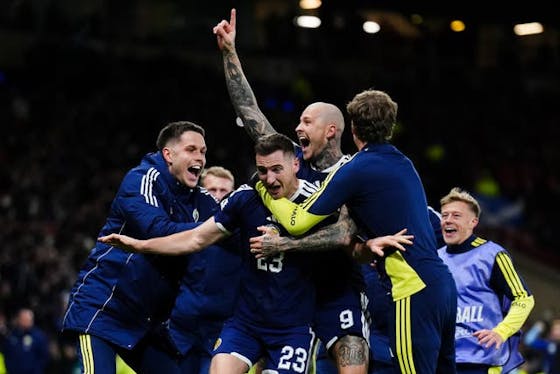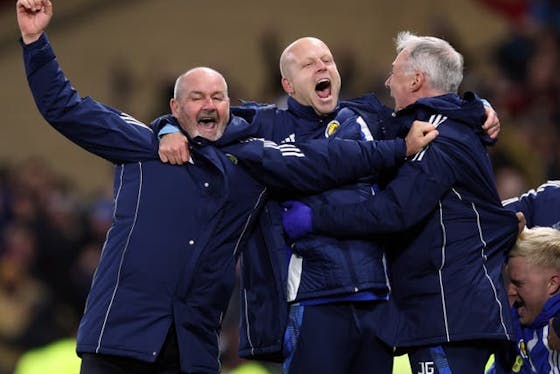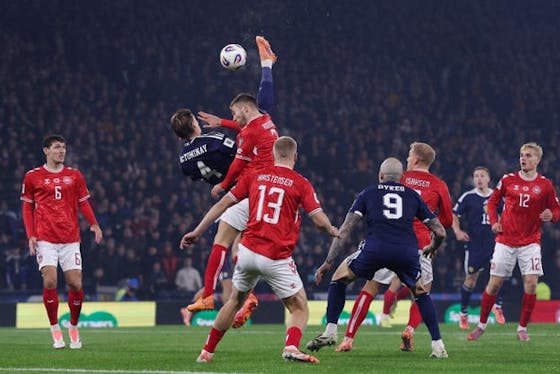How Scotland combined the sublime and ridiculous to make World Cup history
Ah, lads. My guys. Scotland ’s men have qualified for a first World Cup in 28 years, most of my lifetime, and all I can think is how, how have you done it in this way? In the history of Hampden Park, never before have there been the scenes that greeted Kenny McLean ’s strike from the halfway line, or Kieran Tierney ’s left-footed curler that sent a deprived nation through its most glorious night in a generation.
How indeed. Scotland , let’s be honest, deserved what was coming for them when Denmark’s Patrick Dorgu equalised for the 10-man visitors in the 81st minute. If you can’t see out such an advantage, then you don’t deserve a place at the World Cup - or so they said. Until Steve Clarke ’s side ripped up the definition of glorious failure, reminding us all of the team that has now qualified for a third major international tournament, in itself an unprecedented return.
Scott McTominay ’s overhead kick deserved that at the very least. Perhaps the greatest goal ever scored by a Scotland player, surpassing the climax-inducing (as portrayed in Trainspotting ) moment of Archie Gemmill’s solo effort from the 1978 World Cup , the Napoli star leapt as high as the crossbar, soared and sent a nation into delirium. It would, inevitably, come too soon, as waves of Denmark pressure forced Tierney and then, improbably, McLean to come up with the goods that will be remembered for years to come.

open image in gallery
Scotland's Kenny McLean celebrates his goal from the halfway line as the Tartan Army reached their first men's World Cup in 27 years (Andrew Milligan/PA Wire)
For all of the wait, Scotland’s dances at Euro 2020 and Euro 2024 were largely forgettable experiences on the pitch for the Tartan Army, save for the travelling number that certainly made their mark. One of the United States, Canada or Mexico will feel their presence again, and will be greeted by a Scotland side that has proven, beyond doubt, that the collective can be stronger than its individual parts.
How else would Scotland escape from being 3-0 down in Piraeus on Saturday night, conjuring the start of a comeback that led to Denmark bottling their advantage against Belarus and now this. Clarke has been building this side for the past three international tournaments, and, in a rare admission, took some of the credit. “I chose the right group of players and I gave them cap, after cap, after cap,” he said. “So when you come to tough nights, big nights, those lads are going to turn up.”
Scotland were unquestionably helped by Rasmus Kristensen’s sending off, with the second yellow card coming for the softest of touches off a turning John McGinn . On a historic night for Scotland in many ways, super John McGinn’s backside cemented its place alongside Kenny Dalglish as the nation’s greatest of all time. "I thought we were pretty rubbish to be honest, but who cares?" McGinn said. "To get over the line was such an amazing feeling. The gaffer's team talk was exceptional.”

open image in gallery
Steve Clarke has guided Scotland to a third major tournament (Getty Images)
And this was their night, Clarke’s night. The 62-year-old became arguably the most successful Scotland boss in history after guiding the Tartan Army to a third major tournament in five years. The big return at Euro 2020 was secured by the penalties in Serbia that lit up a dark time during lockdown. A follow-up at Euro 2024 included the memorable wins over Spain at Hampden and Norway in Oslo. Will Scotland’s qualifying campaign for the World Cup , which featured the robbery against Greece at Hampden and the sorry sight of the player being booed off after scrapping to a 2-1 win over Belarus, be remembered for anything other than the 18 November and three of the greatest goals Scotland have ever scored? It’s fair to say McTominay, Tierney and McLean wrote themselves into folklore.
The three heroes are, by themselves, an example of the band of brothers Clarke has created. A year and a half ago, McTominay was on the bench at Manchester United, struggling under the weight of the shirt. After taking Italy and Serie A by storm, he is now as iconic, almost, as Diego Maradona is in Naples. Before then, Clarke gave him his confidence, ensuring Scotland was a happy place to turn up to. Tierney the same, as well as McLean, who remained part of Clarke’s pack despite his Norwich City side slipping to the relegation places of the Championship.

open image in gallery
McTominay scored perhaps the greatest goal in Hampden’s long history (Action Images via Reuters)
This, after all, was no accident; McTominay may have produced a once-in-a-lifetime moment of inspiration, Tierney scored his curler from that spot only because of Scotland’s injury troubles at right back, and McLean, well, he saw what no one watching on TV realised when Kasper Schmeichel was so far off his line. But they all delivered for Scotland because of what Clarke has built, a togetherness and spirit that can lift up individuals and overcome wider deficiencies.
Indeed, Scotland have been exposed in their two appearances at the Euros, going out at the group stage on both occasions and failing to win a match in six attempts. A 48-team World Cup will be altogether different; the group that awaits them in December’s draw will be perhaps easier than what Scotland faced in 2021 and 2024, and there remains a record history of failure from when Scotland could have ruled the world in the 1970s and 1980s. But, gradually, this is a side that is rewriting its history and right now, who cares about anything else.